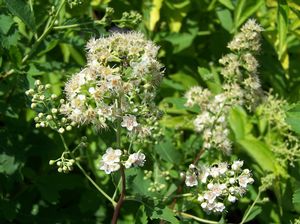View All Plants :: View All DECIDUOUS SHRUBS
Spiraea latifolia (syn. alba)
Meadowsweet
Plant Type:
DECIDUOUS SHRUBSSpiraea latifolia (syn. Spiraea alba var. latifolia) – This is an underutilized Connecticut native happy to colonize in moist, fertile soil. Meadowsweet flowers for a long season mid to late summer with white terminal clusters, sometimes branched, in white or white just touched with pink. Generally a very nice butter yellow fall foliage color sometimes infused with a bit of orange extends the seasons of interest in autumn. The medium brown stems exfoliate on older stems. The flowers turn brown by late season and often hang on the ends of branches into winter. Great in the wild garden or at wood's edge it will want to colonize an area.
Characteristics and Attributes for Spiraea latifolia (syn. alba)
Season of Interest (Flowering)
- Summer / Late Summer
Season of Interest (Foliage)
- Spring / Summer / Autumn
Interesting Bark
- Exfoliating
Autumn Interest
- Fruit / Berries / Seed Heads
- Autumn Leaf Color
Nature Attraction
- Deer Resistant
Light
- Sun Tolerant
- Morning Sun / Afternoon Shade
Attributes
- Natural Garden
- Wildlife Garden
- Massing
- Shrub Border
- Hedgerow
Growth Rate in the Garden
- Medium
Soil
- Draining
- Fertile
Origins
- Eastern North America
Propagated By
- Cutting Grown
Genus Overview: Spiraea
Common Name: Spirea
Spireas are useful shrubs of easy temperament. Making terrific fillers, hedgers and many fantastic foundation shrubs they are renowned for their toughness. They can down face taller shrubs and conifers and are versatile enough to be easily worked into herbaceous gardens where they will provide year round structure. Many are of Asian origin but we have also some fine New World counterparts. Most are happier in more sun. And though drought tolerant they will be more content in fertile conditions. All of the following are cutting grown.


